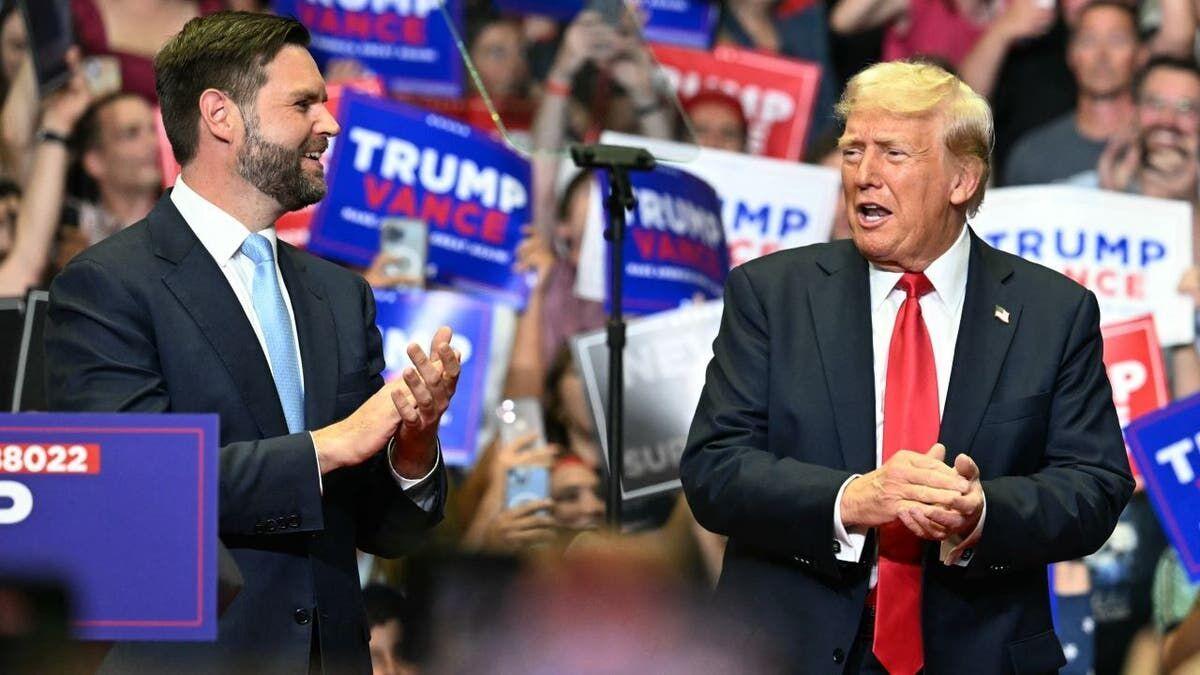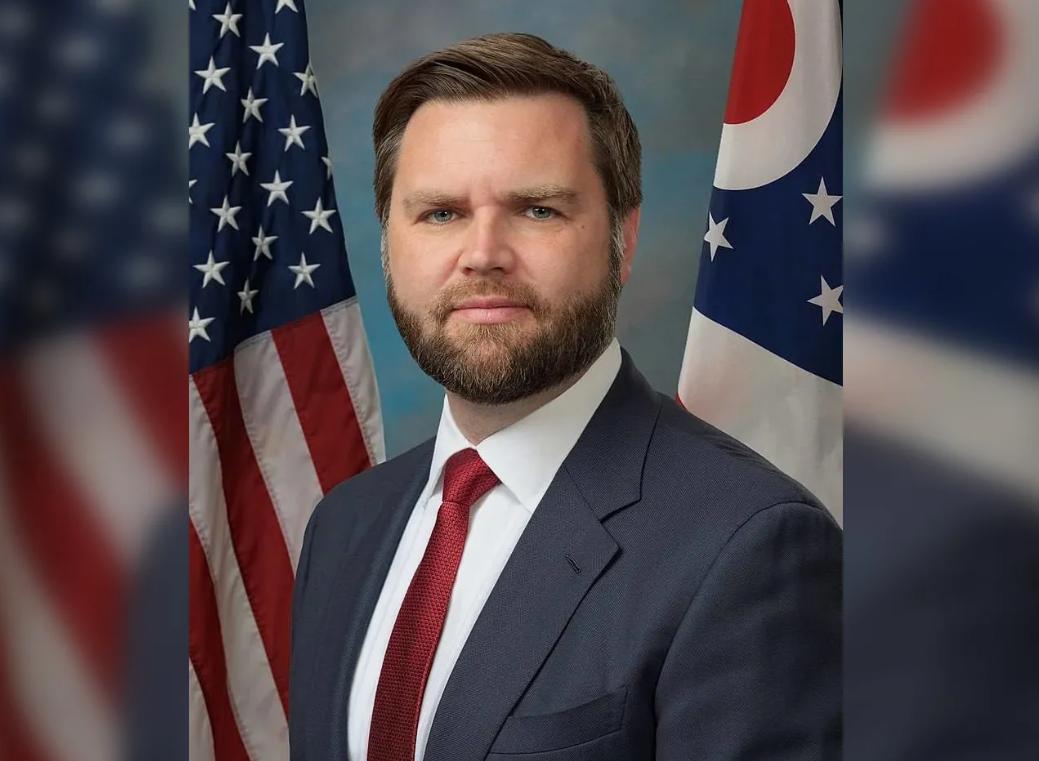Trump’s vice-presidential pick Vance stirs alarm in Europe What’s behind the panic?
While the American Democrats are embroiled in the story of Biden's decision to withdraw from the presidential race, triumph reigns in the Republican camp. At the recent National Conference of the Republican Party, the name of the vice-presidential candidate was announced. The choice of Senator Vance has frightened Washington's European allies and sparked a new wave of speculation about the future of US foreign policy.
The news that Donald Trump has selected Ohio Senator J.D. Vance as his vice-presidential candidate has stirred up the information space. Although the decision was anticipated, numerous alarmist pieces in the media, especially European ones, have emerged, echoing sentiments of "all is lost." The widespread panic is well summarized by a quote from an anonymous high-ranking EU official cited by Politico: "disaster." According to this official, the prospect of Vance’s career advancement to the second most significant political position in the US spells disaster for Ukraine, for Western aid to Ukraine, and for the entire European Union.
What’s causing the fear?
The tone of the comments might lead one to believe that the young senator, who will turn 40 in a few weeks, is unsettling the European mainstream more than Trump himself. Although Trump has been presented by the Western political establishment over the past decade as the main bogeyman and embodiment of evil. This fact alone is noteworthy and raises a natural question: what is it about Vance’s views that causes such alarm?
The vice-president can indeed play a significant role in shaping and implementing US foreign policy, especially if they are interested in it and have the authority in the eyes of the President. However, this position is still far from being the top foreign policy role in the government. On the international stage, vice-presidents often remain in the shadows compared to the President, Secretary of State, Secretary of Defense, Treasury Secretary, National Security Advisors, and the Chair of the Joint Chiefs of Staff. Therefore, the doomed European "all is lost" sentiment is doubly intriguing. What kind of foreign policy can we expect from a Republican administration if the Trump-Vance duo wins in November? And how might it differ from what Washington has accustomed us to over the past decades?

According to the laws of the modern media market, where public attention is focused exclusively on the current news cycle and struggles to remember events from just a few days ago, Vance's foreign policy views are mainly judged based on his statements regarding Ukraine. However, these statements are often simply inserted into existing familiar narratives without delving into the real substance of what was said. Moreover, the Ukrainian issue alone is insufficient for a systematic understanding of the cause-and-effect relationships in Vance's logic and that of his increasingly numerous supporters.
Vance’s worldview
Vance is often characterized as one of the most isolationist members of the Republican Party. But there is a problem with the term “isolationism” in American foreign policy discourse: for many decades, it has been used more as a political label than as an analytical category. Generally, any significant disagreement with the policy of active intervention in the affairs of foreign states, including through military means, quickly gets this label. As a result, it is very difficult to understand what is actually meant by isolationism. Often, it turns out that, as the 27th US President William Howard Taft once put it, “an ‘isolationist’ is anyone who has opposed the policy of the moment.”
This is precisely how things look with Vance. In a Senate speech at the end of 2023, he repeatedly used the same word that anonymous European bureaucrats now use to describe him—disaster. However, in Vance's version, the disaster for the US and the world is American foreign policy of the past three decades. He blames not only the Democrats but also mainstream Republican colleagues who for many years unconditionally supported Washington's widespread intervention in foreign affairs under the banners of combating terrorism and promoting democracy. This resulted in a consensus bipartisan foreign policy. And it is this policy, according to Vance’s public statements, that the potential future vice-president would like to bring to an end.
Overall, he argues for the need to end "United States’ foreign adventures." A more detailed impression of Vance’s worldview can be gleaned from his speeches and comments at the Munich Security Conference held in February this year. His logic starts with the understanding that the United States and the world are living under conditions of resource limitations and must contend with this objective reality. This means that money, weapons, production capabilities, natural resources, energy, and human resources cannot just be conjured from thin air. They either exist or they do not. Conducting policy as if Washington and its allies had unlimited access to infinite material resources, in Vance’s view, is madness and a recipe for the very disaster he warns against.
This premise logically leads the Ohio senator to three practical conclusions. First, the resource deficit makes it impossible to achieve certain goals, even if they seem important and noble. Among these, he includes the goal of securing a Ukrainian victory over Russia on the battlefield: “We simply do not have manufacturing capacity to support a ground war in Eastern Europe indefinitely.” Therefore, Vance believes, it is necessary to honestly inform the public about this and start seeking diplomatic ways to end the hostilities.
Second, the limitations of US capabilities require greater contributions to the common security effort from its allies, especially Europeans. As the vice-presidential candidate reiterates, “America can’t write blank checks indefinitely.” Additionally, this means that Europeans must more thoughtfully and responsibly address their strategic challenges and needs. Vance emphasizes: “For three years, the Europeans have told us that Vladimir Putin is an existential threat to Europe. And for three years, they have failed to respond as if that were actually true.”
Third, the resource constraints necessitate clear prioritization of foreign policy objectives. Here, Vance, like most American politicians today, reaches a logical conclusion: Washington’s priority is the growing confrontation with Beijing. And unlike his stance on Russia, Vance is as hawkish on China as many of the representatives of the "bipartisan foreign policy consensus" he accuses of reckless foreign adventures.
Emphases of the future administration
The new wave of panic in Europe following the news of Vance's selection as the Republican vice-presidential candidate likely stems not from the senator's personal attributes or his future role in Washington’s foreign policy. Rather, in the eyes of the European establishment, it seems to serve as an indicator of the priorities of a potential new Trump administration and the overall evolution of foreign policy thinking within the Republican Party. This evolution is indeed unfolding before our eyes.

Due to Trump’s powerful influence on the party's political agenda, the intellectual centre of the Republican debate is shifting somewhat from neoconservative interventionism towards greater pragmatism and restraint in foreign affairs. Nevertheless, within the ranks of Republicans, there are certainly still adherents of a wide range of views. Even among Trump’s close allies, one can easily find supporters of the entrenched approaches of the past thirty years, such as "liberal hegemony." This refers to a policy of global dominance that appeals to the universality of liberal-democratic values and relies on US military and economic power. Vance loudly criticizes this policy, referring to it as a "disaster." So, what kind of foreign policy line can we actually expect if the Republicans win?
In mid-June, Foreign Affairs published a programmatic article by Robert O’Brien. He served as Trump’s National Security Advisor from 2019 to 2021 and remains one of the most likely candidates for key government positions should the Republicans win in November. The article begins with the famous Latin phrase Si vis pacem, para bellum (“If you want peace, prepare for war”) and the formula “Peace through strength” attributed to the Roman Emperor Hadrian. Republicans, as they have in the past, highlight this formula as the slogan for their anticipated presidency.
The formula is sometimes associated with American neoconservatives, but this seems somewhat artificial and overly simplistic. It is generally characteristic of foreign policy views on both sides of the American political spectrum, especially in recent decades. Being an uncompromising "tough guy" is always more advantageous there than being inclined towards flexible agreements with foreign competitors. The latter are quickly labelled as weak, which is hard to counter in superficial political debates. Moreover, this formula broadly reflects the basic tenets of political realism theory—perhaps the most systematic and influential intellectual school in international relations.
All this suggests that there is no special exceptionalism in the views of Republicans vying for key positions in a hypothetical second Trump administration (as also indicated by Robert O’Brien’s article). These views are typical of American foreign policy thought, even though they add some forgotten nuances from the pre-World War II period to the recent bipartisan consensus. Thus, one should not expect truly revolutionary changes in US foreign policy if the Trump-Vance duo triumphs in November. Just as no such revolution occurred during 2016-2020, none is anticipated now.
Yes, Washington's foreign policy will change. By 2028, when the next presidential elections are due, we will undoubtedly see many new, sometimes strikingly different developments. Changes will be felt in the EU, Ukraine, Russia, and China. However, the main reason for these changes will not be Trump’s victory, the choice of a vice-president, or the appointment of specific individuals to other positions, but rather the objectively occurring changes in international relations. In particular, as Vance emphasizes, the issue of American resource limitations in the context of escalating geopolitical competition with China is becoming increasingly apparent. This is a reality that any US administration, regardless of who leads it, will eventually have to contend with.
It cannot be said that personal factors have no significance in this process. Clearly, the specific decisions of individual political leaders shape the trajectories of history and determine the intensity of such movements, influencing how favourable or tragic they are for particular peoples and entire regions. This historical crossroads is currently unfolding, for example, around Ukraine. The future of this conflict and its impact on Eurasia could vary significantly depending on the name of the next occupant of the White House. The speed of decision-making, even for obviously necessary actions, can also differ between administrations. However, the general direction of the historical process and the response of power like the US are still categories of a higher order than the names of presidents and party labels.
The views and opinions expressed by guest columnists in their op-eds may differ from and do not necessarily reflect the views of the editorial staff.








